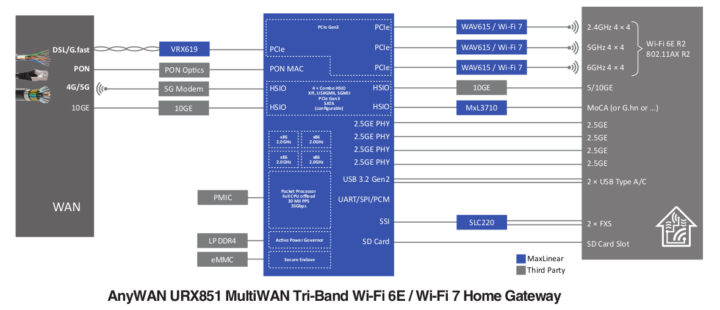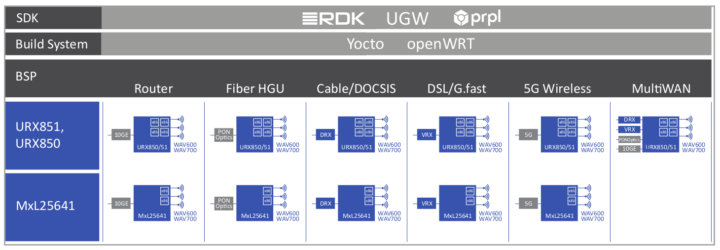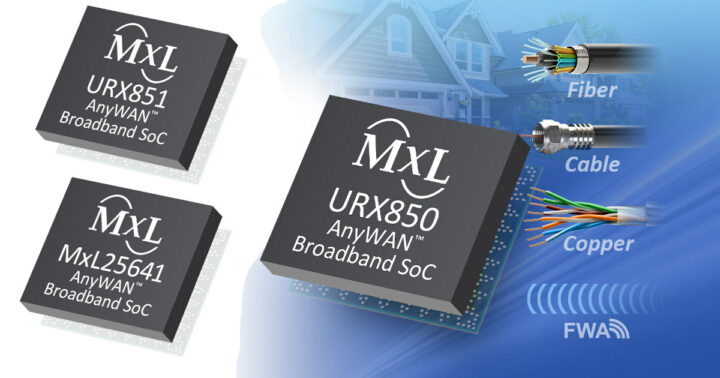MaxLinear has just announced the availability of the first three AnyWAN broadband SoCs featuring Intel Atom cores with the MxL25641, URX850, and URX851 processors designed for 5Gbps and 10 Gbps broadband routers and gateways, usually referred to as CPEs (customer premise equipment).
When I first read the news of MaxLinear releasing Intel Atom SoCs, I could not quite compute how it was possible, as I can’t remember any third-party releasing Intel processors and I thought it might be a system-in-package instead. But MaxLinear keeps calling those Intel Atom SoCs, and the reason is that the company acquired Intel’s Home Gateway Platform Division in 2020.
MaxLinear AnyWAN x86 SoCs key features and specifications:
- AnyWAN URX850/URX851 (for 10Gbps systems)
- CPU – 4x Intel Atom CPU cores @ 2 GHz
- Memory – Up to 16GB LPDDR4 or DDR4
- Storage – eMMC 5.1 flash
- Networking
- 4x 2.5GE PHYs
- XFI WAN
- Packet processor for full CPU offload, 10Gbps IPsec accelerator
- URX851 Only – 10Gbps PON MAC for FTTx
- High-speed peripherals
- HSIOs (high-speed I/O) – URX850: 9x; URX851: 8x
- 4x PCIe gen3
- 4x XFI/PCIe gen4
- 2x USB 3.2 gen2 (10 Gbps)
- Audio – Voice DSP and PCM/SPI interfaces for FXS and DECT support
- Active power management with a dedicated energy processing unit
- Package – FCBGA-837 (24×26mm)
- AnyWAN MxL25641 (for 5Gbps systems)
- CPU – 2x Intel Atom CPU cores @ 1.7 GHz
- Memory – Up to 4GB LPDDR4 or DDR4
- Storage – eMMC 5.1 flash
- Networking
- 10Gbps PON MAC for FTTx
- XFI WAN
- Packet processor for full CPU offload, 5Gbps IPsec accelerator
- High-speed peripherals
- 9x HSIOs
- 4x PCIe gen3
- 4x XFI/PCIe gen4
- 2x USB 3.2 gen1 (5 Gbps)
- Audio – Voice DSP and PCM/SPI interfaces for FXS and DECT support
- Active power management with a dedicated energy processing unit
- Package – FCBGA-577 (17x17mm)

The MxL25641 does not have any native Ethernet interfaces, so I assume PCIe and HSIO can be used for that purpose instead. MaxLinear explains the Atom SoCs can be used for all sorts of WAN connectivity including Fiber, Copper (e.g. xDSL), Cable (DOCSIS), 5G FWA, as well as 10Gbps and 5Gbps Ethernet. In the local network/customer premise, the router or gateway could provide Wi-Fi 6/6E, Wi-Fi 7, local 2.5GbE or/and 10GbE, MoCA, and/or G.hn (home networking up to 2 Gbps), as well as Voice FXS for VoIP telephony.
The company can also provide the AnyWAN Hardware Development Kit URX851 and AnyWAN Hardware Development Kit MxL25641 for earlier development, and the solutions can run Yocto-based prplOS (formerly known as prplWRT) and RDK-B, or MaxLinear UGW (Universal Gateway Software) based on OpenWrt. Since the AnyWAN processors are mostly designed for OEM and ODM manufacturers, there’s very little information available publicly.

A few more details may be found on the product page and press release.
Thanks to TLS for the tip.

Jean-Luc started CNX Software in 2010 as a part-time endeavor, before quitting his job as a software engineering manager, and starting to write daily news, and reviews full time later in 2011.
Support CNX Software! Donate via cryptocurrencies, become a Patron on Patreon, or purchase goods on Amazon or Aliexpress






There’s a dearth of information about these chips despite Intel publishing them on ark.intel.com in 2016… Intel and MaxLinear are both being very tight-lipped, so I can only assume that these products are still not final. For example what process node and Atom family, so we have an idea what power/performance range to expect other than the bandwidth claims?
MaxLinear seems to have a spotty reputation… https://www.servethehome.com/maxlinear-panther-iii-is-a-fake-dpu-at-fms-2022/
These chips are all real and exist, they just don’t have plans to mainline them. You have to use their shitty SDK. Ohhh but you can PrplOS on it, but again layered on top of their shitty SDK.
Lantiq was one of the best companies for networking. They were quite helpful to the community and they were the only SOCs with open drivers available for xDSL.
They also had opened the stack for their VOIPs FXS features and all of this is available in Openwrt.
For years I only bought devices with such SOCs in them. Intel then bought them… and they disappeared from market.
Now Maxlinear acquired them, but I think that the ship is gone. Maxlinear according to some developers of Openwrt is non-collaborative with the community.
There are a lot of devices created during the Lantiq intel merge that are not supported due to the status there was that moment. (WAY 300 was one the not supported on if I remember correctly and also WiFi 5G solututions are/were not working)
One of the few GPON SOC was made by Lantiq, but its stack is old, and not released.
This has been making a lot of issues for the users that are stuck with such hardware.
Sadly, this move away from open source happened before Maxlinear acquired the team from Intel. I’m not sure the situation is worse (or better) under MXL.
My team was working on a project and told Maxlinear we’d only consider their PRX chips (successor to the GPON FALC chips) if they mainlined the chip. They suggested it was on their roadmap, but that was over 2 years ago. No updates since.
Maybe have a look at Airoha, they’re part of the MTK congolomerate and do GPON stuff.
Unfortunatly many users have ONTs based on that HW by their ISPs and more and more uses video streaming. I’ve heard issues with multicast and queue management especially with live events.
I’m a simple End user.
MaxLinear has published a new PR to announce mass production and Broadband Forum BBF.247 Optical Network Unit Certification for PON products.